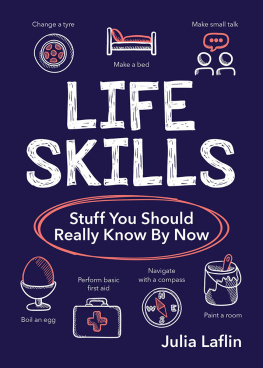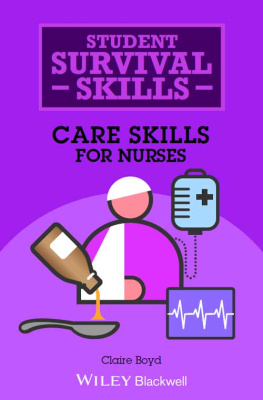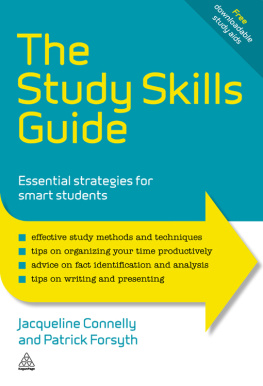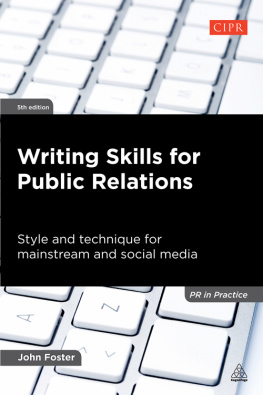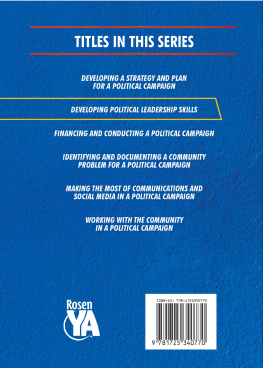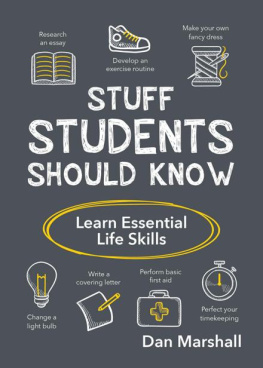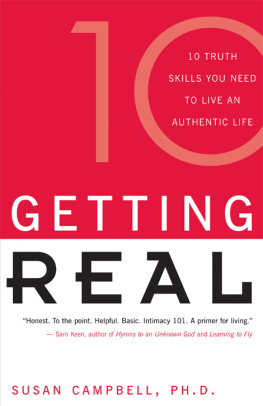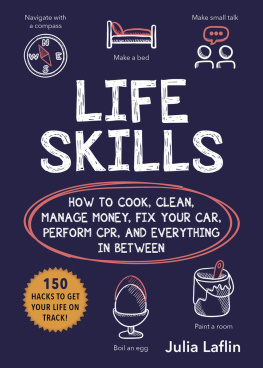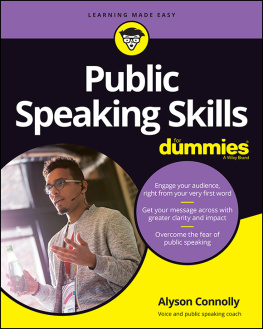LIFE SKILLS
Copyright Summersdale Publishers Ltd, 2018
Illustrations by Kostiantyn Fedorov
All rights reserved.
No part of this book may be reproduced by any means, nor transmitted, nor translated into a machine language, without the written permission of the publishers.
Julia Laflin has asserted her moral right to be identified as the author of this work in accordance with sections 77 and 78 of the Copyright, Designs and Patents Act 1988.
Condition of Sale
This book is sold subject to the condition that it shall not, by way of trade or otherwise, be lent, resold, hired out or otherwise circulated in any form of binding or cover other than that in which it is published and without a similar condition including this condition being imposed on the subsequent purchaser.
An Hachette UK Company
www.hachette.co.uk
Summersdale Publishers Ltd
Part of Octopus Publishing Group Limited
Carmelite House
50 Victoria Embankment
LONDON
EC4Y 0DZ
UK
www.summersdale.com
eISBN: 978-1-78685-699-9
Substantial discounts on bulk quantities of Summersdale books are available to corporations, professional associations and other organisations. For details contact general enquiries: telephone: +44 (0) 1243 771107 or email: enquiries@summersdale.com.
Disclaimer
Neither the author nor the publisher can be held responsible for any loss or claim arising out of the use, or misuse, of the suggestions made herein.
TO............................
FROM......................
INTRODUCTION
Want to be that go-to person because you really know whats what? Then beef up your knowledge, add to your capabilities and include some new life skills in your repertoire.
Whether its to save time and money, impress your friends, help someone out or to get yourself out of a jam, this book is made for you. Theres a whole range of skills here to help you with both the down and dirty and the finer points in life.
Pick up a handy tip you might have missed, refine your sketchy understanding of a subject or try tackling some simple DIY. Learn how to handle yourself in a tricky social situation and how to secure a pay rise.
Keep this book to hand for when you need it, or check out the sections that appeal to you most. Whichever way you use it, start to build up your skill set now!
KITCHEN
Master these recipes and food storage basics and youll do nicely. There are also nifty tips on choosing wine and opening beer and champagne bottles, as well as advice on how to deal with a kitchen fire.
HOW TO
BOIL AN EGG
You will need a small saucepan, an egg, a large spoon and a timer.
Fill the pan with sufficient water to cover the egg. Place the pan on the hob and bring the water to a rolling boil. Gently lower the egg into the water with the spoon and reduce the heat to a gentle boil. Cooking times are based on medium-sized eggs stored at room temperature (for large eggs add 30 seconds extra):
- 3.5 minutes for soft-boiled.
- 4.5 minutes for a firmer set.
- 67 minutes for hard-boiled.
When done, lift the egg out of the water. For softer-boiled eggs, tap the top to crack the shell and prevent further cooking and serve. For hard-boiled eggs, drain the water from the pan and run the egg under cold water to cool it and prevent grey yolks.
HOW TO SEPARATE EGGS
Have two bowls, a saucer and a small cup ready. Carefully crack an egg onto the saucer. Place the cup over the yolk to contain it, then drain the egg white into one bowl. Tip the yolk into the remaining bowl. Repeat this process until all the eggs required are separated. Dont skip the cup and saucer process one broken yolk in the whites will ruin the whole batch.
HOW TO
STORE FRESH FOOD
Follow the storage recommendations on packaged foods. The best before date is intended as a guide for when the produce will taste best. The use-by date on items such as fish, raw meat, cooked products and ready meals deserves close attention as its these foods which could cause stomach upsets or full-blown food poisoning if the use-by date is not respected. Think of the best before as a quality guide and use-by as a health safety check. Make sure that you also finish these products within the stated time from opening for instance, once opened use within three days.
- Home-cooked foods and leftovers: Cool down, cover and refrigerate.
- Meat: Store raw meat away from cooked foods and at the bottom of the fridge to prevent blood from dripping onto other food, which can cause food poisoning. Ensure that cooked meat is properly covered and refrigerated.
- Fruit and vegetables: Store in the fridge if not using straight away or you dont wish to ripen them. Onions, potatoes and apples can be stored on a surface away from direct sunlight or in a cool, dark place, such as a drawer or cupboard. Tomatoes should never be refrigerated as they will lose their flavour.
- Eggs: No need to refrigerate.
- Cooked rice: Refrigerate as soon as its cool ideally within 1 hour and eat within 24 hours, either cold from the fridge or reheated until the centre is piping hot. Never reheat rice more than once.
Shops sometimes display goods in chiller units because they are best served cold and to give them the appeal of fresh food. If in doubt, keep it in the fridge at home.
HOW TO
FREEZE FOOD
Generally, food should be frozen on the day of purchase (although if its stored in the fridge you can extend this time to nearer the use-by date). Most ready meals and packaged raw meat and fish come with instructions as to whether they are suitable for freezing. Follow the label recommendations for how long you should store food in the freezer. If you exceed this date, there will be a deterioration in quality and texture.
If youre buying food from a butcher or deli counter, ask the sales assistant if it is safe to freeze it. Sometimes raw products have been previously frozen, meaning theres an opportunity for unhealthy bacteria to grow if they are re-frozen.
Its OK to freeze meat and fish again once they have been cooked in a dish. As a rule, cooked leftover dishes, soups and stews freeze well. Ensure theyre cold before freezing.
Use freezer bags with sealing clips or zip-lock tops and a permanent marker to label each bag. Clip tightly or fill to the top dont leave an air gap. Use rigid food containers for soups and liquids.
Foods that dont freeze well:
- Raw foods with a high moisture content such as salad leaves, cucumber, watermelon or oranges, unless you plan to eat them frozen; they turn to mush when defrosted.
- Creamy foods like yogurt, cream and custard which will separate into curds and whey.
- Starchy foods like pasta and crumble toppings.
HOW TO
MAKE A SALAD DRESSING
You will need good quality olive oil, white wine vinegar or lemon juice, salt, Dijon mustard, runny honey and a clean, empty jam jar with a lid. This dressing will go well with any kind of leaf or raw vegetable salad; your friends will beg you for the recipe.
As a base, use three parts olive oil to one part white wine vinegar or lemon juice and put these into the jar. The oil coats the salad ingredients and the acid in the vinegar or lemon cuts through the oiliness and adds zing.
Add a pinch of salt, half a teaspoon of Dijon mustard and half a teaspoon of runny honey. If you dont have honey, dissolve half a teaspoon of sugar in a tiny amount of boiling water.

